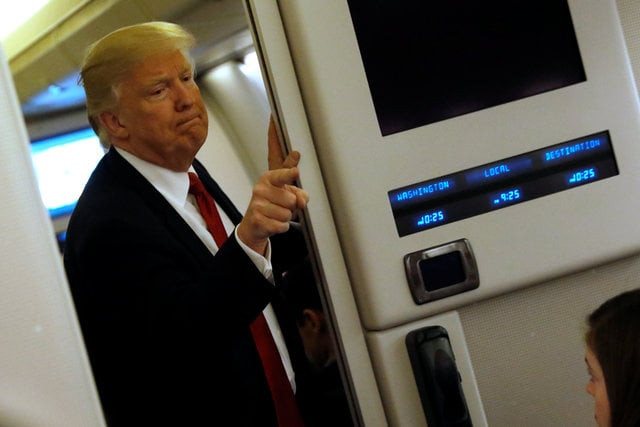Trump's revamped travel ban halted
Hawaii judge freezes Trump's revamped travel ban

U.S. President Donald Trump speaks to reporters aboard Air Force One as they approach Joint Base Andrews, Maryland, U.S. March 15, 2017. REUTERS/Jonathan Ernst
US District Judge Derrick Watson ruled that the state of Hawaii, in its legal challenge to the order, had established a strong likelihood that the ban would cause "irreparable injury" were it to go ahead.
The court in Honolulu was the first to rule in a trio of legal challenges against the ban, which had been set to go into effect at midnight.
Decisions were expected later Wednesday from federal courts in Washington state and Maryland.
Trump signs new travel ban targeting six Muslim nations
The ruling means a nationwide freeze on enforcement of section two of the order, banning entry by nationals of Iran, Libya, Somalia, Sudan, Syria and Yemen for 90 days.
It also halts section six, which would have suspended the US refugee admissions program for 120 days.
There was no immediate comment from the White House, which had argued that the travel ban is necessary to keep extremists from entering the United States.
The Trump administration's wide-ranging initial travel restrictions imposed on January 27 were slapped down by the federal courts, after sparking a legal, political and logistical furor.
Trump signed a revised ban behind closed doors on March 6 with a reduced scope exempting Iraqis and permanent US residents but maintaining the temporary ban on the other six countries and refugees. The White House said those six countries were targeted because their screening and information capabilities could not meet US security requirements.
Trump signs new travel ban targeting six Muslim nations
But Watson rejected the White House claim that the order wasn't a Muslim ban, ruling that it would not be a leap "to conclude that targeting these countries likewise targets Islam," because of their Muslim populations range from 90.7 per cent to 99.8 per cent.
The judge made reference to several examples of Trump explicitly framing proposed action on immigration in religious language, including a March 2016 interview during which the then president-elect said: "I think Islam hates us." "Mr Trump was asked, 'Is there a war between the West and radical Islam, or between the West and Islam itself?' He replied: 'It's very hard to separate. Because you don't know who's who,'" the judge added.
In Greenbelt, Maryland, Judge Theodore Chuang was expected to rule on a separate complaint filed by a coalition of advocacy groups that the amended order discriminates against Muslims. "In his mind, the danger of Muslims and the danger of refugees is all combined danger," Omar Jadwat, a lawyer for the American Civil Liberties Union, said of the president.
New Trump travel order remains a Muslim ban: US rights groups
The first version of Trump's order triggered protests at home and abroad as well as chaos at US airports as people were detained upon arrival and either held for hours or sent back to where they came from.
The Trump administration narrowed the restrictions in its revised order to try to ensure it would be unassailable this time around.
"This order doesn't draw any religious distinction at all," said Jeffrey Wall, a government attorney.
Questioned about tweets that Trump sent and statements he made during the presidential campaign in which he promised to enact a "Muslim ban," Wall said: "There is a difference between a president and a candidate."
But critics say the new order essentially remains a ban on Muslims coming to the United States, and therefore unconstitutional because it singles out people of a certain religion for discrimination.
Since September 11, 2001, the worst attacks in the United States have been committed either by radicalised Americans or by people from countries not on the Trump travel ban list.
Critics also argue that it will have a very negative effect on schools, universities and the business world, mainly the high tech sector, which employs many highly skilled immigrants.
Trump administration considering separating women, children at Mexico border
The new battle against Trump's order is being played out on several geographical fronts, but mainly on the west coast, which tends to be pro-Democrat.
The state of Washington, joined by five other states, filed a complaint Monday with the same Seattle judge who stayed Trump's original travel ban in February.
Trump responded by insulting that federal magistrate, James Robart, calling him a "so-called judge."
Robart will oversee the Washington state hearing on Wednesday and he could once again suspend all or part of the new order.



















COMMENTS
Comments are moderated and generally will be posted if they are on-topic and not abusive.
For more information, please see our Comments FAQ